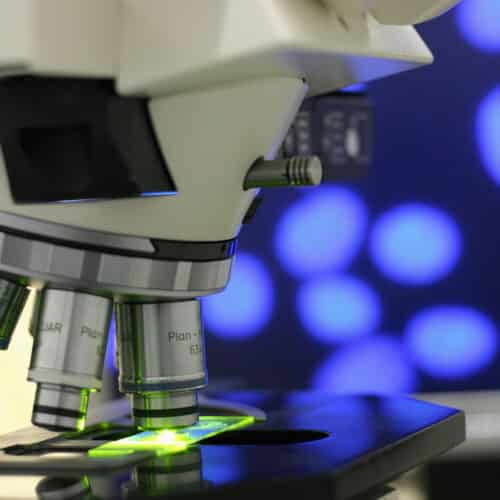Our 2022 research summary

2022 has seen Cure Parkinson’s emerge from the COVID pandemic with a bumper year of research activity; with clinical trial results being reported and exciting, innovative research projects being awarded funding.
We are proud to share this end of year summary of some of these highlights.
Clinical trial results
During 2022, we received results of three major Cure Parkinson’s supported clinical trials focused on disease-modification for Parkinson’s.
Liraglutide
The top-line results of the phase 2 liraglutide study, which evaluated this diabetes drug being repurposed as a potential treatment for Parkinson’s, were presented. Liraglutide is a GLP-1 receptor agonist and is very similar to exenatide which provided very encouraging phase 2 clinical trial results in 2017. The liraglutide study reported positive findings in the participants’ non-motor symptoms and quality of life measures. These findings add to a growing body of data supporting GLP-1 receptor agonists as a treatment for Parkinson’s and Cure Parkinson’s is continuing to champion this area of research.
UDCA
The ‘UP-Study’ clinical trial assessing the liver disease drug ursodeoxycholic acid, or UDCA, was completed and the results showed that UDCA was safe and well-tolerated in the 30 trial participants after 48 weeks of treatment. Professor Oliver Bandmann’s team at the SITraN Institute in Sheffield have stewarded this drug all the way from a preclinical screening experiment to this recent phase 2 clinical trial, and Cure Parkinson’s is now working alongside the team to help take this drug into further more advanced clinical testing.
Deferiprone
The third major clinical trial that provided results in 2022 was the FAIRPARK II study, which involved 372 people with very early-stage Parkinson’s. Researchers were investigating whether the drug deferiprone would slow the progression of Parkinson’s. Deferiprone is an iron-chelating drug which is used to remove excess iron from the body; iron builds up in vulnerable areas of the brain in people with Parkinson’s, and it is proposed that removing excess iron might slow the progression of the condition. The results of this study, however, indicated that the removal of iron in the participants with early-stage Parkinson’s had a negative impact on their symptoms. This effect contrasted with previous positive results, from those participants in the trial who had more advanced Parkinson’s.
Other research highlights in 2022
In addition to these large trials, there were a number of smaller pilot clinical studies that provided encouraging results in 2022.
Firstly, the first in-human testing of a new drug called Anle138b which reduces the clustering of a protein called alpha synuclein; a characteristic of Parkinson’s.
Cure Parkinson’s has been supporting the biotech company MODAG in developing Anle138b and we look forward to the next stage in its clinical development.
There were very interesting results from a clinical study in Norway assessing biomarkers in 30 people with Parkinson’s who were treated with nicotinamide riboside for 30 days – nicotinamide riboside is a member of the vitamin B3 family which helps energy production in cells. This study has provided the foundation for the much larger NOPARK study, which is currently assessing the disease-modifying potential of nicotinamide riboside in 400 people with Parkinson’s.
Supporting the UK Clinical Trial Network
In 2021, Cure Parkinson’s trustees awarded funding for the setting up and management of the UK Parkinson’s Disease Clinical Studies Group (UK PD-CSG), led by Professor Oliver Bandmann of Sheffield University. The group had its inaugural meeting in May 2022 and continues to meet every other month to ensure that UK neurologists are more collaboratively connected with their research colleagues; to highlight new and ongoing clinical studies; to help with recruitment of participants, and provide training and opportunities for the next generation of clinician researchers seeking to slow or stop the progression of Parkinson’s. Cure Parkinson’s is proud to be the foundational funder of this initiative.
Pre-clinical research developments
Cure Parkinson’s independent research committee reviewed and evaluated a large number of grant applications for research funding in 2022 recommending the trustees fund a number of innovative laboratory-based projects.
One of these is exploring the Tuberculosis (TB) drug called rifabutin which has the potential to be repurposed as a disease-modifying therapy for Parkinson’s. Professor Lorraine Kalia of University of Toronto and her research team conducted a drug screening study and found that rifabutin exhibited neuroprotective properties in models of Parkinson’s; it also reduced levels of alpha-synuclein clustering – a characteristic of Parkinson’s. This new research will provide further data on the possible biological mechanism of action and potential biomarkers that could be used in a clinical pilot study of this drug in people with Parkinson’s.
Cure Parkinson’s is also funding Professor Heather Mortiboys research which is looking at the potential of two agents identified in a drug screening study that are currently used to treat gout – the inflammatory arthritis condition – that also have the potential to be repurposed for Parkinson’s. Like rifabutin, if the results of this laboratory research are supportive, these therapies could be quickly progressed into a clinical trial in people with Parkinson’s.
Looking forward to 2023!
The research team at Cure Parkinson’s are very excited about the many projects that are lined up for 2023 already, and the many more that are in preparation! In 2023, we will learn the results of three additional major clinical trials investigating the diabetes drugs – GLP-1 receptor agonists – for Parkinson’s. There will be the launch of the ambroxol phase 3 clinical trial, and the start of additional clinical trials of other treatments that have been prioritised by our International Linked Clinical Trials (iLCT) committee.
We also hope to fund our first iLCT pipeline project to drive forward the research needed to get more potentially disease-modifying agents into clinical trials. With the slow-down that resulted from the COVID pandemic behind us, we are building up steam and look forward to making significant progress in 2023 and beyond!
I am really encouraged by the momentum that we are building at Cure Parkinson’s. When the organisation was first founded, onlookers thought the idea of disease-modification was a fantasy. Now, however, that mindset has changed, and every bit of research we support gets us closer to that final goal
Helen Matthews, Deputy CEO, Cure Parkinson’s




